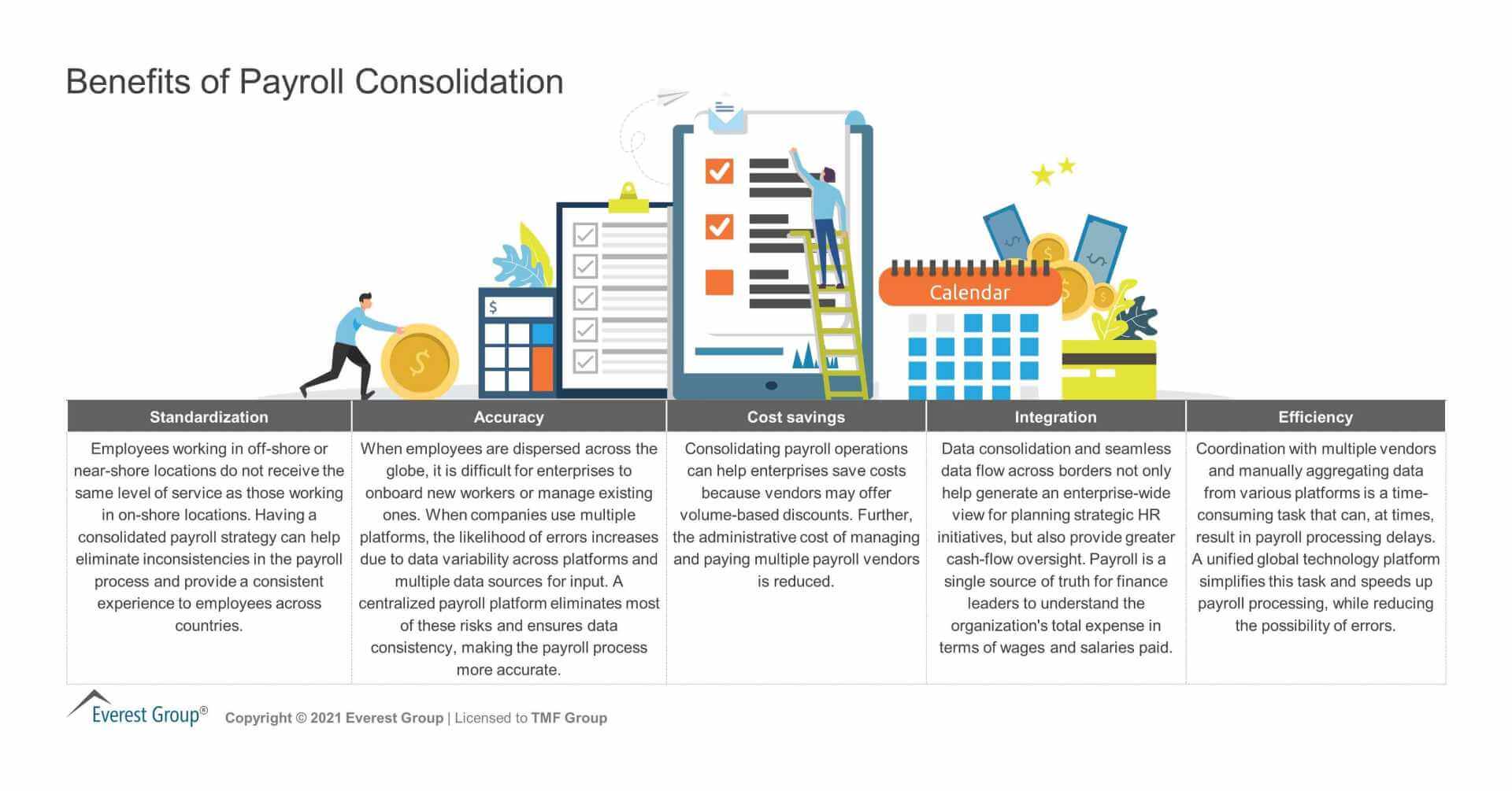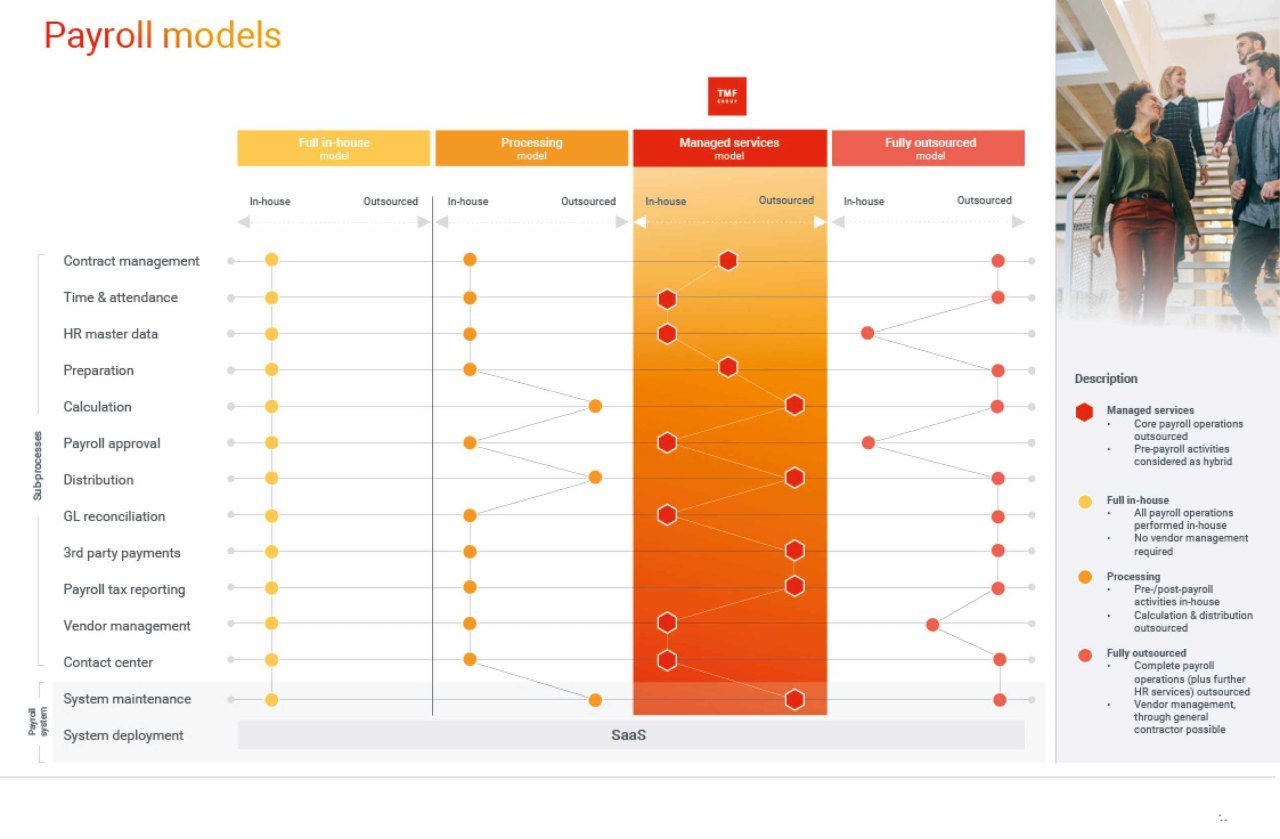Guide to successful payroll outsourcing

Why outsource payroll?
One of the biggest benefits of outsourcing payroll to a trusted service provider is the freedom it gives companies to focus on the strategic aspects of talent management. In-house HR and payroll professionals can leave day-to-day operations to managed services providers. They are free to turn their focus to truly transformative talent management projects, which help to build the business’s brand and create a compelling employee value proposition.
The Covid-19 pandemic has made remote and hybrid working the norm for many companies, and prompted people to reevaluate their work–life balances. In many ways, it is now easier for employees to move on if they are not happy. A smooth payroll process contributes to employee engagement and satisfaction by always ensuring people get paid accurately and on time, and by enabling easy, secure access to guidance and documentation.
Delivering this on a global scale requires specialist payroll expertise in each jurisdiction where a company has employees. However, keeping on top of complex, ever-changing rules and regulations is a major headache, even for large corporates – especially in smaller markets, where there may only be a handful of employees with very limited, or no, payroll-related expertise. Outsourcing payroll to a global provider with local expertise on the ground overcomes this challenge.
A further benefit of payroll outsourcing is business efficiency and risk reduction. Outsourcing payroll offers a cost-effective, secure and comprehensive solution for payroll processes and technology. Companies can gain access to the latest technology from a professional service provider, with the in-depth expertise to ensure high levels of visibility, control, compliance and data security to minimise business risk.

Source: paper ‘Multi-country Payroll (MCP) Consolidation Demystified. Key Considerations for an Employee-Centric Payroll’ by Everest Group.
What are the different payroll outsourcing models?
Businesses have several options when it comes to payroll outsourcing, in which day-to-day management of the payroll function is handed over to external payroll outsourcing service providers to a greater or lesser extent. There are advantages and disadvantages to using each of these models, and the ultimate decision depends on the type of support the business requires.
The main approaches are:
‘Processing’ – a hybrid solution – also known as a ‘bureau’ model – where some of the functions are outsourced to a payroll vendor. These might include calculation of the gross-to-net, and production of the payroll outputs, such as reports, payslips and bank files.
Hybrid in-house/outsourced – to get around the challenge of using the fully in-house approach, some organisations employ in-house payroll resources in larger markets and outsource payroll to partners to cover smaller markets on a regional or local basis. This provides a flexible and relatively cost-effective way to access local payroll expertise and knowledge in smaller markets.
Managed service – aggregator outsourced – this model partially deals with external provider management challenge by handing global responsibility for payroll to a main contractor, which manages third-party providers in smaller markets where it does not have coverage. Again, this can lead to poor visibility and blurred lines of responsibility, with third-party providers potentially playing the ‘blame game’ when things go wrong.
Managed service – partner – in this model, a single payroll outsourcing provider takes on complete responsibility for global payroll delivery in every country the organisation operates in. This allows for a single point of contact for the organisation to go to when there are changes to be made or issues to address, and lines of responsibility are very clear.

How do you choose the right payroll outsourcing model for your needs?
With several payroll outsourcing models available, how do you choose one that best fits your business needs? One size does not fit all, so it is essential to understand how the differences in approach can affect the smooth running of your payroll operations.
Here are some key considerations:
Individual payroll needs – no two businesses are the same. An outsourced payroll solution needs to provide a good fit with the total number of employees, the number of locations being served, the complexity of the local regulations in these locations, the business’s expansion plans, the availability of in-house payroll expertise and technology integration needs, among others.
Compliance is key – when partnering with a payroll provider, you are putting your trust in their ability to remain compliant with local regulations. While responsibility for tax compliance and other filings may shift to your provider, the penalties for non-compliance stay with you.
System compatibility – payroll outsourcing service providers typically use a technology tool known as middleware to deliver services, and this needs to be compatible and integrate seamlessly with your company’s human capital management (HCM) system. Finding a payroll provider that uses a flexible system to work seamlessly with your time and attendance (T&A) system or provide outbound integration with your general ledger (GL) can save both time and money in the long run.
In-country provider – choosing an in-country provider can be a good option for businesses to outsource payroll if they have no plans to expand their operations abroad. In this model, the provider is based in the country where the employees work and have knowledge about the local payroll rules, but don’t have offices elsewhere or provide multi-language solutions. These factors could prove to be limitations, however, if the business expands internationally.
Aggregator model – for businesses looking for a single process globally, using an aggregator payroll provider may seem like the perfect fit. However, aggregators usually contract with third-party, in-country providers to execute payroll for global companies, which can result in inconsistent service levels and lack of control and potential risk for non-compliance penalties.
Global providers with local knowledge – using a global provider with local knowledge ensures payroll is processed and delivered in-country by local experts located in the jurisdiction where employees work. Many are able to integrate seamlessly with your HCM, as mentioned above, allowing visibility and control over global operations, with local ticket raising capability for local employees. Sensitive employee data does not cross borders.
How do I select a payroll outsourcing provider?
Once you have decided on the payroll outsourcing model that best fits your needs, it’s a question of choosing an individual provider that can deliver your payroll requirements most effectively. Based on our experience of managing outsourced payroll operations for many companies around the world, here are our top six selection criteria:
Local compliance
Non-compliance with local payroll-related regulations is serious, and can result in fines or even jail time. Be sure your provider understands the local legislative environment and has a feel of where it is going. You should be able to access this on-the-ground, real-time expertise whenever required, so that you are always up to speed with the latest regulatory changes happening in country.
Process control and visibility
Multinational payroll directors need to be able to monitor payroll, streamline processes and ensure on-time, accurate delivery right down to local country level. Managing payroll through one global, online tool is the ideal.
Meaningful reports and dashboard analytics
It is essential to be able to provide your stakeholders with reports with actionable insights to help them make smarter decisions and carry out practical assessments of performance and costs.
Information security standards and data protection
It is worth checking providers’ credentials to ensure they are certified, reliable and able to protect employee data. For example, international certifications such as ISO 27001 and ISAE set out how services should be delivered to provide global consistency and quality assurance.
Standard scope and relationship management
Your payroll provider should be an extension of your payroll team, forming a strong, flexible partnership that evolves as your business does. It should understand your business needs and approach the relationship as a partnership, based on good communication, proper Service Level Agreements (SLAs) and good local knowledge.
Employee experience
The accurate and timely delivery of payroll underpins employee experience. It is vital for maintaining morale, productivity and trust.
Why are SLAs important?
Service Level Agreements (SLAs) with service providers are advisable across all business functions, and especially so with payroll outsourcing providers. Poor performance in payroll delivery not only has a detrimental impact on employees and potentially company reputation, it can also lead to non-compliance with local employment laws, fines, penalties and even jail time for company executives. Ideally, organisations should have global SLAs in place to set expectations across all services, wherever they are delivered.
An SLA sets out the baseline levels of service a business should expect from a payroll vendor, and what remedies are expected if the service falls short of these levels. Ideally an SLA should be part of the contract with the vendor, with a standard of service clearly defined. However, according to our experts, very few companies focus on the required levels or standards for those agreed services: only one in 20 companies broach the topic of an SLA, and these tend to be larger corporates with sophisticated procurement procedures.
The impact of payroll provider under-performance should not be underestimated; it can affect an organisation’s reputation and employee morale significantly. For example, a provider missing salary payments may constitute a breach of employment terms. Similarly, employees not being provided with timely responses to their queries can also adversely affect employee experience and engagement. Statutory payments not being made on time can result in fines or penalties from regulators.
Companies considering outsourcing their payroll should consider asking the potential provider for their position on SLAs. Not every provider agrees to provide SLAs, especially agreements that include a penalty clause for service failures.
In addition to governing the client-provider relationship with a clear and measurable approach, a robust SLA provides insights on performance indicators, demonstrating opportunities for your company to pursue improvements with the provider and within your own organisation as a whole, to help drive it forward.
What role does technology play in payroll outsourcing?
Technology has a key role to play in managing outsourced payroll operations. Payroll technology solutions provide analytics to effectively report on payroll performance, to support better-informed business decisions and ensure greater control and consistency in global operations. A comprehensive service and technology solution is essential to providing a global payroll service that also supports accurate and timely global reporting, analytics, visibility and control of core data.
Here is some of the key functionality that technology solutions can bring to payroll management:
Process status – visibility of processing status on an individual payroll basis, across the globe, with easy access to data through a standard global reporting tool that eases everyday workloads. Comprehensive dashboards – charts, heat maps and metric statistics – enable you to fully visualise your payroll results.
Accessibility – the solution should allow management to access the right payroll information at the right time and from anywhere in the world.
Consolidation and integration – being able to consolidate and integrate payroll data from disparate systems into single format, global reports will help produce meaningful insights that can drive better-informed business decisions.
Efficiency – a selection of standard reports, or the ability to download core data into your own data warehouse for internal reporting helps improve efficiency. It also reduces frustrations, enhances employee engagement and so provides an improved payroll service.
Control – KPIs are common in the payroll industry. KPI and SLA monitoring dashboards help keep track of both supplier and in-house service deliverables.
Audit – solutions should have a comprehensive audit facility and reporting tool, to give your auditors peace of mind.
Payroll technology platforms are beginning to adopt artificial intelligence (AI) and machine learning (ML) technologies become better at helping companies automate ever more complex processes. We are starting to see the adoption of more sophisticated AI and ML systems capable of handling multi-step payroll processes – even helping to drive their simplification.
Another key area of development in payroll technology is improved integration with enterprise management platforms, such as human capital management (HCM) solutions, including time and attendance (T&A) systems. The benefits of using a payroll outsourcing vendor that has integration partnerships with enterprise management vendors like Workday include:
- automated, repeatable and standardised integrations between in-house systems and the payroll outsourcing vendor – enabling the vendor to generate and update data for companies to use in their local offices to process payroll, for example.
- reduced risk through certified, tried and tested integration build and maintenance
- faster payroll deployments and reduced in-house resource requirements.
What can go wrong when outsourcing payroll?
A successful relationship with a payroll outsourcing vendor can last for many years. But there are some common pitfalls when outsourcing payroll, some serious enough to warrant switching providers.
These are some of the top causes of things going wrong:
Accuracy – if an outsourcing payroll vendor gets an employee’s pay wrong once, you will hear about it. If it gets it wrong again, there is a serious issue somewhere in the chain. The reason you engage a third party to take care of your payroll is to ensure someone is there putting time and effort into ensuring accuracy. If that accuracy is absent, chances are you’ll be combing the contract looking for an escape clause.
Keeping up with legislation – payroll-related legislation is a movable feast, especially as jurisdictions move to electronic reporting for tax, social security and labour information, and gradually withdraw pandemic support measures. Your payroll solution must be flexible enough to react at the right time in the right way. Companies often do not have the in-house resources to keep on top of legislation themselves, so rely on external providers to stay up to speed… and compliant. Lack of performance in this area is a very common cause for vendor change.
Systems – even the best software solutions become obsolete, replaced by newer, faster, more capable solutions. Vendors and developers are constantly moving on. If you have a multi-year payroll outsourcing contract, what clauses are in place to ensure the software used to pay your staff remains up to date and can access service support when necessary?
Organisational change – company strategy changes; what worked for you last year might not necessarily be right for next year. The company could be subject to a merger or acquisition, there could be changes in senior management, there might be a group-wide roll-out of a new IT system that renders existing payroll software useless. Payroll vendors need to be able to roll with these punches.
Contact accessibility – one of the most common issues in payroll outsourcing vendor management is account managers not being as accessible as they should be. It can take too long to get hold of the right person to answer a query or resolve an issue, with repeated calls and unanswered emails. Sometimes, there are many layers of personnel or administration to navigate before a satisfactory response to a payroll query is received.
Escalation efficiency – another pain point is the difficulty faced in escalating an issue to higher levels in the payroll outsourcing vendor. Escalation procedures in the vendor company can be slow and inefficient, and the issue may become a crisis before help can be engaged.
Coordination issues – coordinating a multi-country payroll outsourcing vendor relationship is always challenging. But it is made especially risky and arduous when an aggregator model is used. Sourcing a local vendor for each country makes sharing knowledge and coordinating tasks across geographies complex and time-consuming. Different suppliers will deliver different levels of service and output, with no common key performance indicators (KPIs). This causes problems from a central reporting perspective, and means there is no single view of global payroll processing. A lack of coordination for deliverables negotiated in multiple contracts is another common challenge.
Relationship issues – any one of the above might be the cause of friction when it comes to managing the payroll outsourcing vendor relationship, or it may have been a bad fit from the start.
Ideally, you need to be working with an outsourcing payroll partner you can trust to get on with the job and get it done right; someone you can call on for help when it’s needed. You need a partner that provides a responsive single point of contact, wherever you are in the world. Direct access to the country subject matter experts and management is a huge positive.
If you’re looking to outsource your payroll operations, check out our global payroll services. With capability in over 140 countries, we can help you handle your local payroll and compliance – globally.





